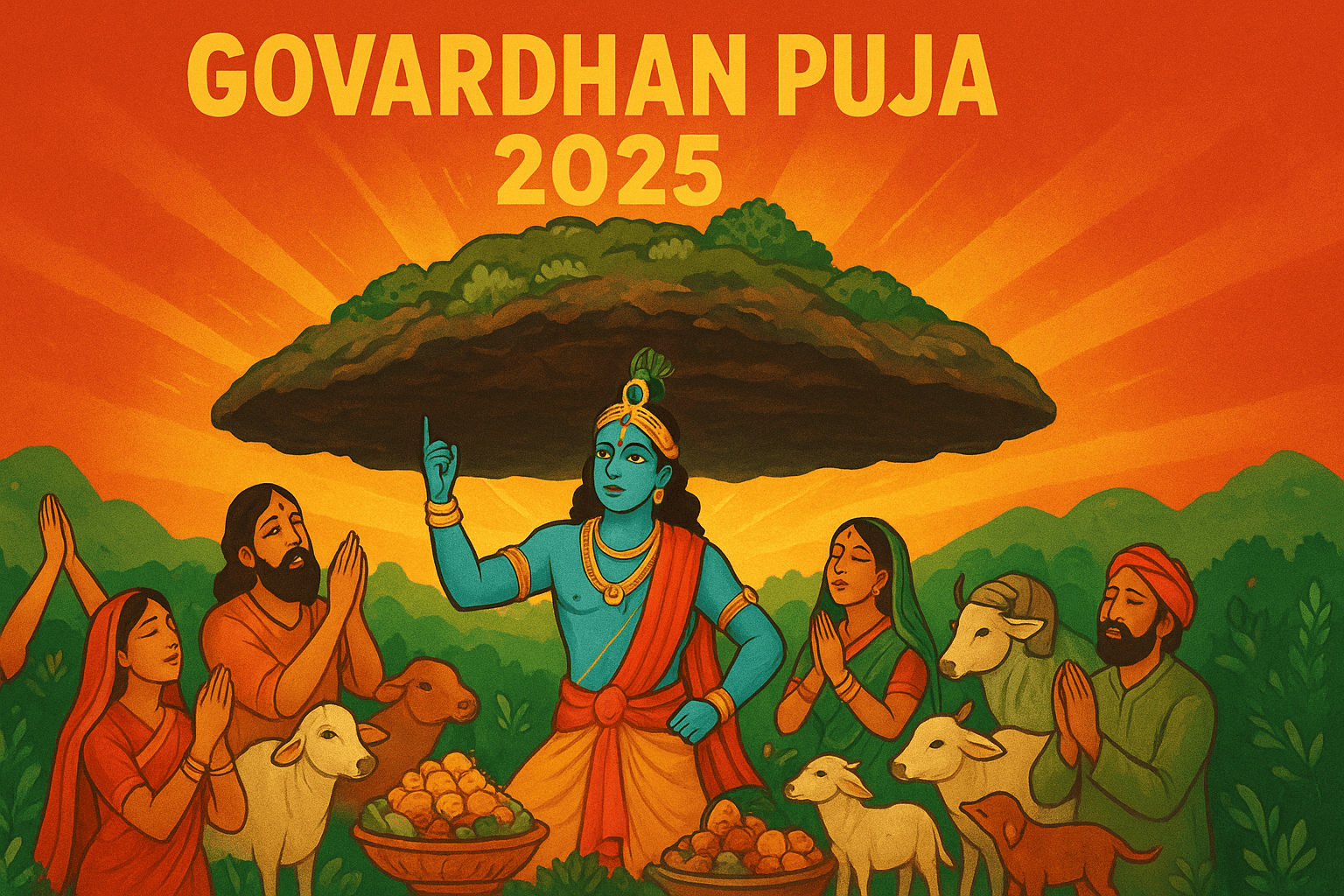Diwali is a five-day festival, and while the main celebration of lights and Lakshmi Puja often takes center stage, each day holds its own unique significance. The fourth day is dedicated to Govardhan Puja, a beautiful festival of gratitude that honors Lord Krishna and the deep connection between humans and nature.
In 2025, Govardhan Puja will be celebrated on Wednesday, October 22, 2025. It’s a day of deep spiritual meaning, reminding us to be thankful for the abundance of nature and the protection of the divine.
This blog will take you through the captivating story behind Govardhan Puja, its key rituals, and how it is celebrated across different parts of India.
The Story Behind Govardhan Puja
The story of Govardhan Puja comes from the Puranas, ancient Hindu texts, and is a beloved tale of Lord Krishna’s divine power and his lesson on gratitude.
According to the legend, the villagers of Vrindavan would worship Lord Indra, the god of rain and storms, every year to ensure he provided a good harvest. Lord Krishna, still a young boy, convinced the villagers to stop this practice. He argued that it was the majestic Govardhan Hill and the surrounding nature that provided their livelihood, sustaining the cows and the lush land. He encouraged them to worship the hill instead.
Enraged by this defiance, Lord Indra sent down a furious storm, threatening to flood the village. The villagers, terrified, turned to Lord Krishna for help. With a calm and confident demeanor, Lord Krishna lifted the entire Govardhan Hill with just his little finger, holding it up like a massive umbrella. The villagers and their cattle took shelter under the hill for seven days and nights until Lord Indra, humbled by Krishna’s divine power, finally stopped the storm.
This act of protection taught everyone a powerful lesson: one should be grateful for and worship what truly sustains them, be it nature or the divine.
Rituals of Govardhan Puja
Govardhan Puja is celebrated with great devotion and unique traditions. The central ritual involves the creation of a miniature Govardhan Hill from cow dung.
- Making the Hill: Families and communities create a small replica of the Govardhan Hill using cow dung. This isn’t just a simple mound; it’s often decorated with flowers, leaves, and various foods to make it look beautiful. Sometimes, small figurines representing Lord Krishna, the villagers, and their animals are placed around the hill.
- Annakut Offering: The most important part of the celebration is the Annakut, which literally means “mountain of food.” A huge variety of vegetarian dishes, often over 56 different items (Chappan Bhog), are prepared and arranged in a mountain-like shape. This offering is made to Lord Krishna, symbolizing the immense bounty that nature provides.
- Worship and Prayers: Devotees perform a special puja, or prayer ceremony, to the Govardhan Hill and the Annakut offering. The prayers are a way of giving thanks to Lord Krishna for his protection and to nature for its sustenance.
- The Feast: After the puja, the Annakut prasad (blessed food) is distributed among family members and the community. It’s a communal feast that brings everyone together to share in the blessings.
Govardhan Puja Across India
While the story and rituals are similar, the celebration of Govardhan Puja takes on slightly different forms across the country, reflecting regional traditions.
- North India: In states like Uttar Pradesh and Haryana, the festival is celebrated with immense enthusiasm. People sing folk songs and perform traditional dances, celebrating the victory of Lord Krishna.
- West India: In Gujarat, the day after Diwali is celebrated as Bestu Varas, the beginning of the new year. While Govardhan Puja rituals are performed, the day is also a time for business owners to close their old ledgers and open new ones, seeking blessings for a prosperous year ahead.
- Punjab and Haryana: Here, it is also celebrated as Padwa, where wives apply a tilak to their husbands’ foreheads and pray for their long lives. It’s a day that celebrates the bond between a couple.
The Significance of Gratitude
More than just a festival, Govardhan Puja is a day to reflect on the importance of gratitude. The story of Lord Krishna lifting the hill teaches us to appreciate the blessings we receive from nature and the divine. It’s a reminder to:
- Honor Nature: Give thanks for the food we eat, the water we drink, and the natural resources that sustain our lives.
- Trust in the Divine: Have faith in a higher power to protect us from life’s storms.
- Community Spirit: Come together as a community to share blessings and celebrate.
This special day encourages us to move past blind worship and embrace a deeper sense of appreciation for what truly nurtures us.
As we celebrate Govardhan Puja 2025, let’s take a moment to be thankful for the blessings in our lives and the enduring power of nature.
Wishing you a joyous and blessed Govardhan Puja!



